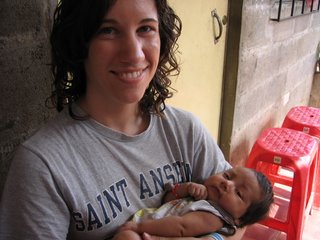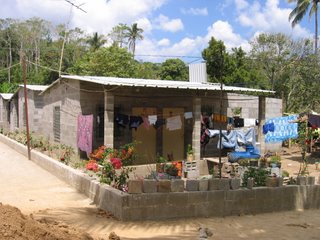the world is given to all
I spent the weekend in Camden, New Jersey with two college students and two nuns. We stayed at the Romero Center, a Catholic retreat and social justice center whose mission is "to build bridges of understanding between people of faith in urban and suburban churches, leading people to a deeper awareness of our prophetic vocation, as we respond to our sisters and brothers in remarkable need."
There's a lot I could say about the weekend. I could tell you that Camden is the poorest city in our rich nation and that only 28% of its residents graduate from high school. 28%! Or that the reported unemployment rate is almost 16% and the actual rate may be as high as 32%. You may be surprised to know that the food stamp allotment per person per meal in the state of New Jersey is 86 cents. That's less than $3 per day! As part of our immersion experience we shopped for a day's worth of food on this amount of money and ate only that food, and it was HARD. I could recount the stories of a woman who directs one of the only HIV/AIDS ministries in Camden, about people with the virus being abandoned and scoffed by their families, about nurses refusing to enter their hospital rooms, as if the very air they breathe is infected with AIDS, as if they hold no dignity, as if their suffering is nothing. I could talk about the rampant drug crime or the lack of affordable housing. There's the homelessness problem and the continuous corruption of city government, the condemned homes and the environmental hazards.
I could talk about all this. But I won't.
Instead I'm going to tell you this. New Jersey is the wealthiest state in the nation.
That's right - the poorest city is in the richest state in the richest country on earth. This serves only to magnify the injustices on perpetual display in Camden. And there are very few people who care. As one of the staff of the Romero Center put it, not many people wake up in the morning and say, "I think I'll go to Camden today." This is not to discount all of the people who do very good work to put an end to poverty, its causes and effects in Camden. On the contrary, their efforts are well noted. It is, however, to highlight what is, in my estimation, our greatest failure as a people. A rich people, that is.
Let me take a step back in order to explain. One of our prayers at the Romero Center included this song:
Bryan Sirchio
"If You Eat Each Day"
Haiti is the poorest country in this hemisphere
I go there now and then to get my vision clear
Sometimes it gets so hazy in this land of
I consume therefore I am
I was working in this clinic for the dying & diseased
Living skeletons with AIDS and TB
Organized and run by Mother Teresa and her sisters of Charity
I asked the nun in charge, Sister, what should I do?
She smiled and said I've got a job for you
Then she gave me a pair of scissors, and said,
See that man right there
He'd like for you to cut his hair
I said, oh, Sister are you sure?...
I mean its not like I have given
many haircuts in my day
But I was there to help, so I just smiled and said, OK
So there I was, this natural born Vidal Sassoon
just snipping that hair away
We struck up conversation as best we could
His English was broken, my Creole's not too good
But we managed to communicate enough for him to say
Something I never will forget
You see I asked him, do you think I'm rich?
And this was his response to me
He said, well how many times a week do you eat?
Well his question took my voice away
And then he said, you mean you eat every day?
And I said, yeah, and he just said this
Well if you eat each day, you're rich
Somehow that moment felt to me like Holy Ground
I finished his haircut and when I turned around
There was a whole line of customers
who kinda like the way I cut that one man's hair!
So I gave them haircuts but they gave me so much more
They gave me the perspective of the poorest of the poor
And I know I'll spend the rest of my life
trying to somehow respond
'Cause if its true as we often say that wealth is relative
It just might take the dying poor in a place like Port au Prince
To help us see this relativity from God's point of view
To cut through our first world denial with gospel Truth
And as for me, I know I need to receive this paradigm shift
That in a hungry world, if we eat each day...
We're rich
Haiti is the poorest country in this hemisphere
I go there now and then to get my vision clear
Sometimes it gets so hazy in this land of
I consume therefore I am
Words & Music by Bryan C. Sirchio
© 1999 Crosswind Music Ministries
All Rights Reserved - www.sirchio.com
I know Haiti isn’t Camden and the developing world is not our world. But the unemployment and education rates in Camden certainly are more akin to those in the third world than to our national averages. Camden and other places like it are our third world right here at home. There are differences, to be sure, and I’m not making a comparison of degree, but a point of our failure to care for our own.
Our failure as a rich people is that we don’t care about the powerless. In fact, we go further. We curse them, fear them, blame them. We pretend that our collections of material comfort – our SUVs and McMansions, our designer clothes made in sweatshops and our computers dumped in toxic heaps in China when we no longer want them – we pretend that these things somehow matter more than the dignity and livelihood of another human being.
We don’t choose the situation into which we are born. I know I wasn’t asked if I’d rather be born in a middle-class suburb or a despicable, rat-infested city. And I’ve come to believe that when we make assumptions and stereotypes about our brothers and sisters born into that other world, when we deny our responsibility to share our education, resources, and wealth and open our hearts to them, treat them as equals, acknowledge that we have failed to recognize God’s intention for his people, we are being just as racist and classist as slaveholders of the Old South or the champions of apartheid in South Africa.
The people of Camden reinforced this for me. They blessed me with the gift of discomfort. Not the kind of being away from my daily comfort zone, but the sort in which I’m reminded of a very daunting and vital task. And so I will continue to explore what this means for me, what life is like for them, and what we share as a people on a common journey.
-----
“You are not making a gift of your possessions to the poor person. You are handing over to him [her] what is his [hers]. For what has been given in common for the use of all, you have abrogated to yourself. The world is given to all, and not only to the rich.” ~Saint Ambrose





